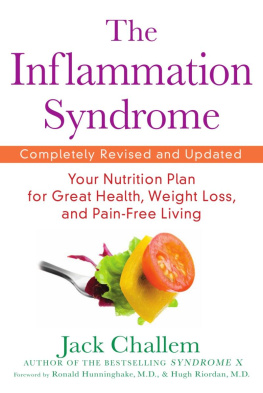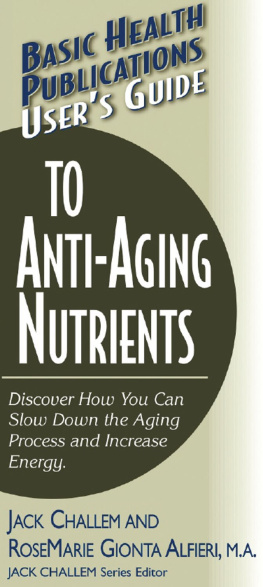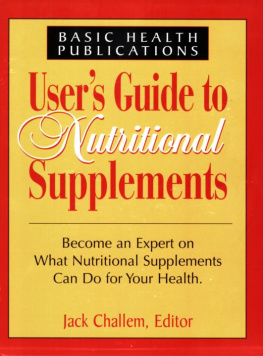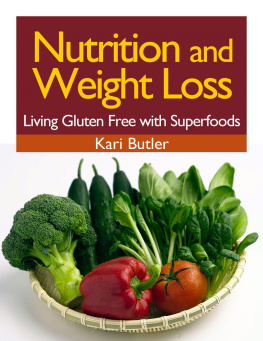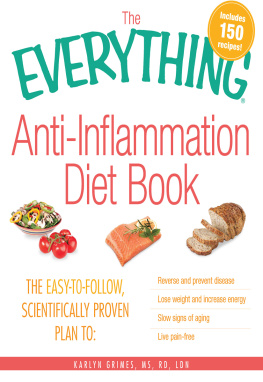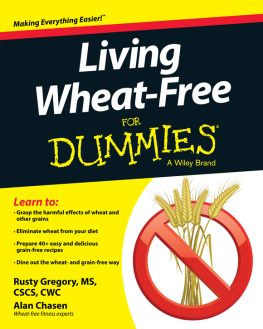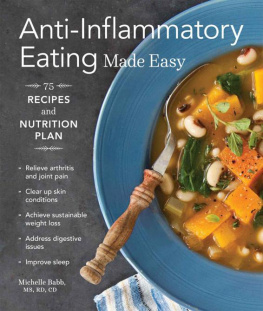Table of Contents
Copyright 2010 by Jack Challem. All rights reserved
Published by John Wiley & Sons, Inc., Hoboken, New Jersey
Published simultaneously in Canada
The Inflammation Syndrome and Anti-Inflammation Syndrome are trademarks of Jack Challem.
Table on page 56 is from S. B. Eaton and S. B. Eaton II, Paleolithic vs. Modern DietsSelected Pathophysical Implications, European Journal of Nutrition 39, no. 2 (2000): 67-70. Reprinted with kind permission of Springer Springer & Business Media.
No part of this publication may be reproduced, stored in a retrieval system, or transmitted in any form or by any means, electronic, mechanical, photocopying, recording, scanning, or otherwise, except as permitted under Section 107 or 108 of the 1976 United States Copyright Act, without either the prior written permission of the Publisher, or authorization through payment of the appropriate per-copy fee to the Copyright Clearance Center, 222 Rosewood Drive, Danvers, MA 01923, (978) 750-8400, fax (978) 750-4470, or on the web at www.copyright.com. Requests to the Publisher for permission should be addressed to the Permissions Department, John Wiley & Sons, Inc., 111 River Street, Hoboken, NJ 07030, (201) 748-6011, fax (201) 748-6008, or online at http://www.wiley.com/go/permissions.
The information contained in this book is not intended to serve as a replacement for professional medical advice. Any use of the information in this book is at the readers discretion. The author and the publisher specifically disclaim any and all liability arising directly or indirectly from the use or application of any information contained in this book. A health care professional should be consulted regarding your specific situation.
Designations used by companies to distinguish their products are often claimed as trademarks. In all instances where John Wiley & Sons, Inc., is aware of a claim, the product names appear in Initial Capital or ALL CAPITAL letters. Readers, however, should contact the appropriate companies for more complete information regarding trademarks and registration.
For general information about our other products and services, please contact our Customer Care Department within the United States at (800) 762-2974, outside the United States at (317) 572-3993 or fax (317) 572-4002.
Wiley also publishes its books in a variety of electronic formats. Some content that appears in print may not be available in electronic books. For additional information about Wiley products, visit our website at www.wiley.com.
Library of Congress Cataloging-in-Publication Data:
Challem, Jack.
The inflammation syndrome : the complete nutritional program to prevent and reverse heart disease, arthritis, diabetes, allergies, and asthma / Jack Challem.Rev. and expanded ed. p. cm.
Includes bibliographical references and index.
eISBN : 978-0-470-55956-7
1. InflammationDiet therapy. 2. InflammationAlternative treatment. 3. Chronic diseasesEtiology. I. Title.
RB131.C.0473dc22
2009037586
In memory of Harold G. Miller,
teacher, mentor, and friend
FOREWORD
O ccasional injuries are part of the human experience, and healing is the bodys self-repair process. Healing begins with inflammation, which nature uses to clean up damaged tissues and protect against infection. So if inflammation is beneficial, why are so many modern diseases characterized by chronic and unhealthy inflammation?
This revised edition of The Inflammation Syndrome answers a major part of this important question. Chronic inflammation underscores and promotes virtually every disease, affecting millions of people, yet inflammation is also a symptom rather than the fundamental cause of these diseases. When we dig deeper, we find that chronic inflammation is the consequence of an injury to the body, combined with nutritional imbalances or deficiencies. To properly treat inflammatory diseases, it is essential to correct the underlying dietary problems.
We speak from experience. At the Center for the Improvement of Human Functioning International, physicians, nurses, and other staff members have focused on these objectives for more than thirty years. We use careful clinical and laboratory workupswhat is now termed evidence-based medicine to assess the health, nutritional reserves, and biochemical uniqueness of each patient. We have successfully treated people from around the country and around the world, many of whom were considered untreatable or incurable by conventional medicine.
Through these detailed individual workups, we have gained an understanding of chronic, or sustained, inflammation. More often than not, individuals with chronic inflammation, such as arthritis and asthma, have low levels of anti-inflammatory antioxidants (for example, vitamins E and C), omega-3 fatty acids, and other important nutrients. Many patients also have previously undetected adverse food reactions, abnormal gut permeability, yeast overgrowth, and hormonal imbalances. All of these factors can impair the normal functioning of the immune system, sustaining inflammation well beyond its biological usefulness.
The pharmaceutical perspective of inflammation focuses on relieving symptoms through over-the-counter analgesics and far more powerful prescription drugs. Inflammation does not result from a deficiency of aspirin, cortisone, or Cox-2 inhibitors. Rather, as The Inflammation Syndrome so well documents, there is a desperate need to address the basic nutritional influences on chronic inflammation. After all, no drug can ever make up for a nutritional deficiency. Under these circumstances, it becomes paramount to nourish a persons biochemistry with the best nutrition.
This is where measuring a patients nutrient levels proves to be so helpful in confirming the underlying nutritional and biochemical causes of inflammation and in motivating patients to act. It would be easy to lecture a patient on the anti-inflammatory effects of good nutrition, omega-3 fatty acids (which include fish oils), or vitamin E. But a far more powerful motivator is testing and demonstrating the patients low levels of specific nutrients.
By doing so, we have found time and again that such hard evidence is extremely persuasive. This meaningful individual information, combined with the ease of making dietary improvements and taking supplements, empowers patients with knowledge and motivates them to undertake self-healing. Patients develop the attitude I want my levels to be optimal, and then they work toward achieving them. Furthermore, from our medical perspective, laboratory testing enables us to later recheck nutrient values to confirm proper absorption and utilization.
Through testing, we have realized that no one can ever assume that a persons diet is adequate. For example, a cardiac surgeon would never simply hope his patients potassium level is sufficient to prevent fatal arrhythmias during heart surgery; he ensures that it is. The same approach applies to the treatment of chronic inflammation. To achieve optimal levels of many nutrients, one must often consume amounts of vitamins, minerals, and other nutrients greater than those officially recommended for health. There is nothing wrong in doing so, especially when tests have shown patients to be low in these nutrients. At the very least, erring on the side of modest excess provides a margin of safety, a dose of nutritional insurance.
Jack Challem, the author of The Inflammation Syndrome , is a gifted health writer with a profound understanding of the role good nutrition plays in health. He has written a sound and practical book of benefit to anyone with chronic inflammation. As we read and discussed his book, we visualized Jack working in a huge lighthouse. The light being emitted is the cumulative scientific evidence so deftly organized and clearly presented here. The danger is the jagged rocks of chronic, sustained inflammation, which underlie almost every serious health issue facing modern societyand the reason for the lighthouse. All of usreaders, patients, and physicians alikeare piloting our own boats and, as a society, we are heading for the rocks. Will we see the light? Can we avoid the forces making us drift in the dark? To survive, we must rediscover the great Hippocratic ideal: Let food be thy medicine.


